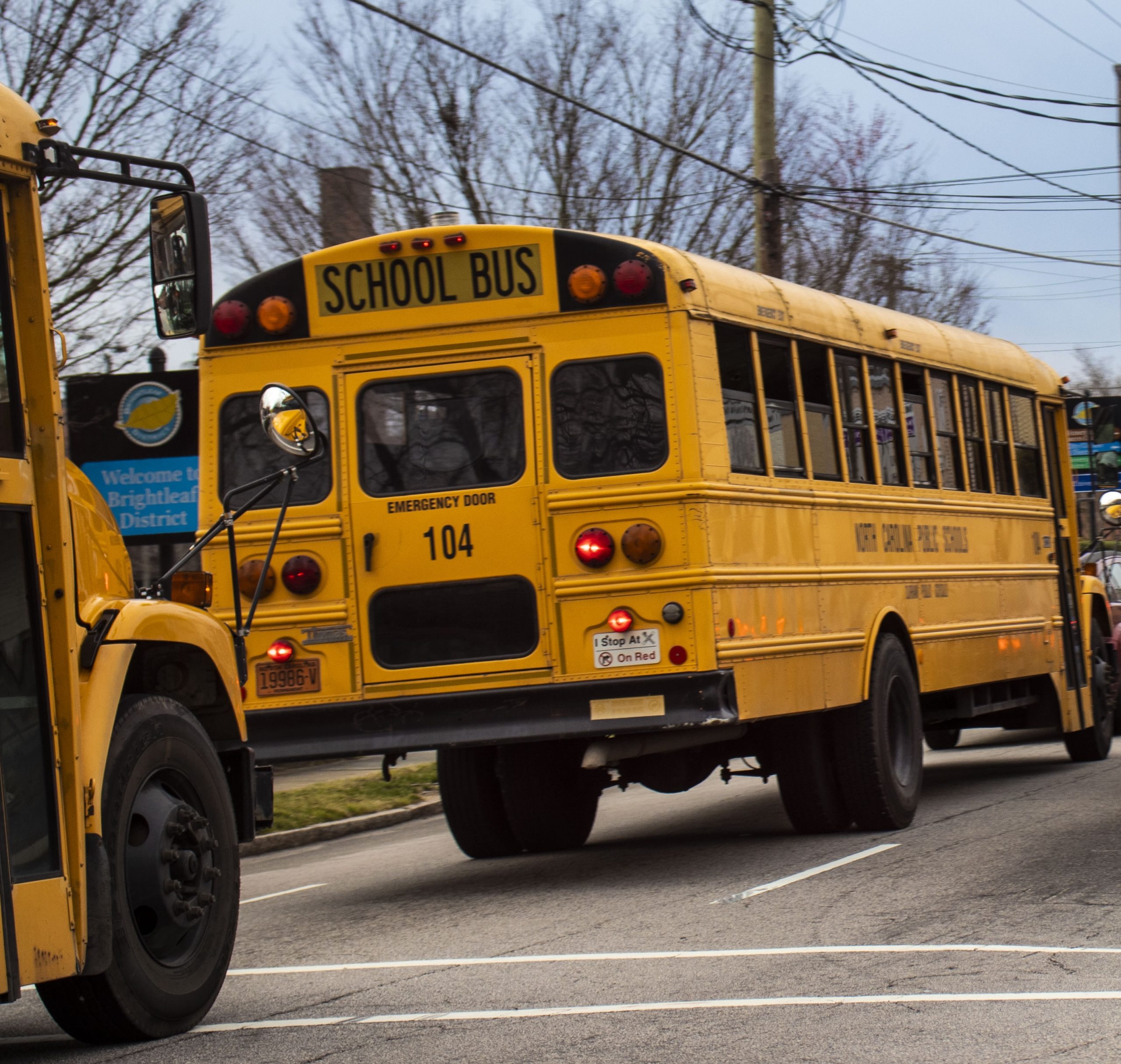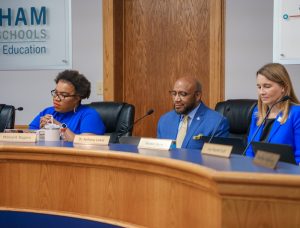Durham schools will stop providing bus service within one mile of 21 elementary schools, and will instead require most parents living within those “family responsibility zones” to transport their children to school, the school board decided Thursday night.
The board also voted to continue planning “express bus stops” for students attending three schools: Durham School of the Arts, Rogers-Herr Middle School, and the School for Creative Studies. Both steps aim to resolve the ongoing bus driver shortage that has afflicted the district since August.
Prior to the vote, bus drivers urged the board to give them a voice at the table.
“We would love to meet with the superintendent…,” said DPS bus driver Larry Dixon. “Let us give you a true perspective of what goes on on these buses on a day-by-day basis that we have to deal with.”
Retha Daniel-Ruth, who has driven school buses for the district for 31 years, echoed Dixon.
“The solution here is worker voice…,” Daniel-Ruth said. “Don’t make decisions and then come to us as, like, a protocol and say ‘Okay, we’ll talk to you now but we’ve already decided what we’re going to do.’”
The board’s “rotational bus service” plan also received mixed reviews. The plan, which took effect at the beginning of December and was recently extended to Jan. 17, means that the district provides families with only four days of bus service coverage instead of five, in an attempt to ensure more consistent routes.
“That rotation plan is not working,” Daniel-Ruth told the board. “As you see there are a lot of kids that are getting left out.”
On the other hand, Rebecca McDonald, parent of a DPS kindergartner, said the approach has helped to reduce absences.
“At Creekside Elementary School the rotational bus service has immensely helped reducing the number of students that are absent or staying very, very late,” McDonald said. “Our school has been disproportionately impacted and we really appreciate the equitable approach.”
The district will now return to five-day bus service on Jan. 21.
The family responsibility zones, which were approved in a six-to-one vote, mean that some families living within a one-mile radius of identified elementary schools will no longer receive bus service starting on Jan. 21. Not all families who live within a one-mile radius of the elementary schools fall in the zones, said Matthew Palmer, DPS’ senior executive director of school planning and operational services. Palmer said he and his team have gone in person to look at the streets and sidewalks and worked with school principals to identify where the plan could be safely implemented.
The sole “no” vote came from board member Bettina Umstead, who raised concerns regarding the equity of the zones.
“I worry we’re shifting who can get to school and not,” Umstead said.
Palmer estimates the zones will affect 750 to 800 students, down from the original 1,000 estimate when the zones were first proposed.
The express bus stops for students at Durham School of the Arts, Rogers-Herr Middle School, and the School for Creative Studies, were even less popular among board members. The stops would mean that some families at the three magnet schools would need to transport their children to a nearby DPS elementary or middle school that they do not attend. The students would then be picked up by the bus for transport to their actual school.
However, board members raised concerns that when families applied to the magnet schools they did so under the presumption of transportation by the district.
As Sarah Smith, a working mom of two DPS students put it during public comment, “Durham parents have ordered their whole lives under the previous busing situation.”
The first vote to “continue to research, implement” express stops for secondary magnet schools failed.
The board ultimately voted to continue studying the express stops proposal as a plan to end rotational coverage. The plan will be brought back to the board on Jan. 9 with more details and a grievance procedure. The amended measure passed four-to-two, with chair Millicent Rogers and Umstead voting against. Board member Wendell Tabb was not present for the vote.
While the board is focusing on the two new measures in the short term, Palmer says that the long-term focus is on the driver workforce.
Currently, 214 candidates are in the hiring pool, though they need to go through background checks, training, and licensing before becoming DPS school bus drivers. Since September, 12 new drivers have joined the staff to make up a 143-driver workforce.
A focus on skilled labor is not only about hiring but also retention, Palmer explained.
“There’s a lot of stress on our drivers…,” Palmer said. “There are a variety of reasons that drivers leave. Some of them are workplace frustration, pay. We can go down the list of what we’ve heard. And some folks are retiring.”
Earlier in the evening, driver Larry Dixon spoke to the workplace stress.
“We as bus drivers and monitors, we’ve been having a tough time on the school buses,” Dixon said. “A very tough time. Many of us are definitely considering walking away because of what we have to go through to drive that school bus. We go through a lot of mental, verbal abuse that is just not sustainable for us.”
The board will revisit the crisis on Jan. 9, where the public can expect further discussion about the potential for express bus stops.





